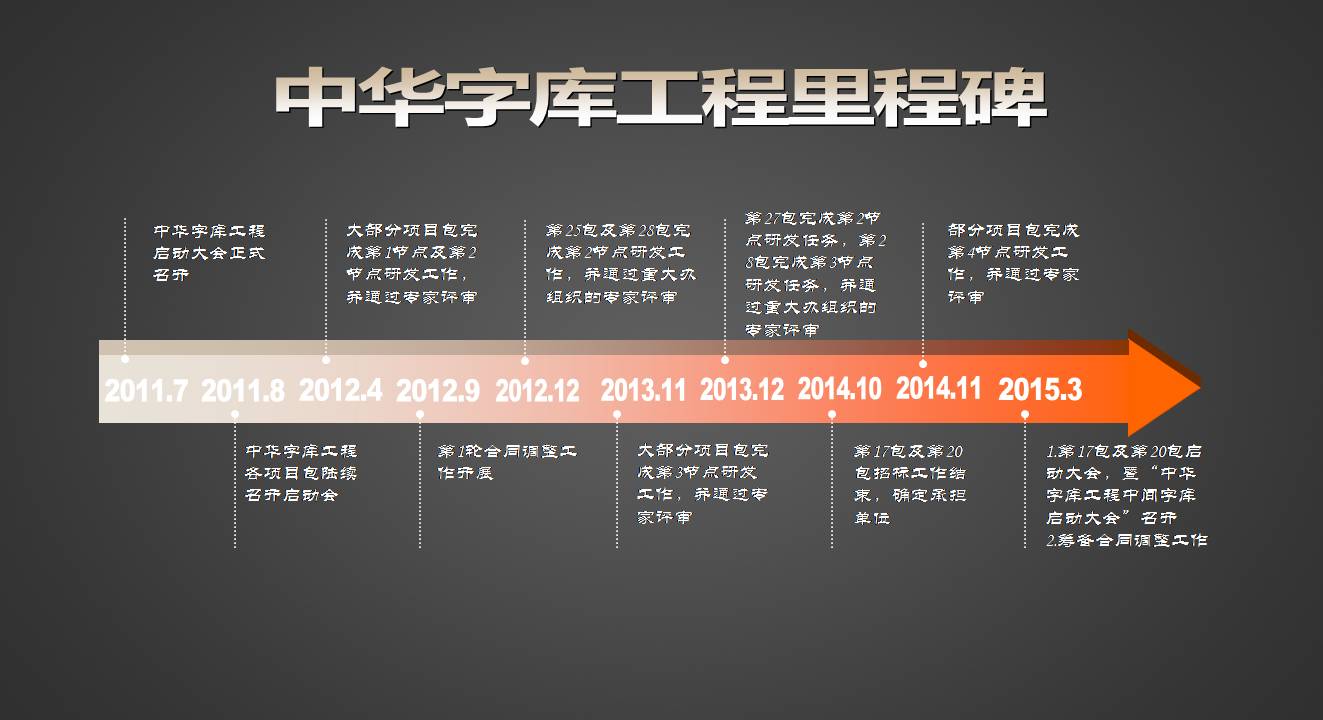Media Report

- The New York Times: The Opinion Pages comments: "This month, the Chinese government plans to introduce codes for some 3,000 Chinese characters as part of a grand project, known as the China Font Bank, to digitize 500,000 characters previously unavailable in electronic form. Until now, only 80,388 characters have been encoded in the international computing standard, Unicode. The project highlights 100,000 characters from the country's 56 ethnic minorities, and another 100,000 rare and ancient characters from China's written corpus. Deploying almost 30 companies, institutions and universities, it's the largest state-funded digitization project ever undertaken....China has struggled with the global information architecture that favors the Western alphabet. Not any of the significant innovations in modern communications — Morse Code, typewriters and the ASCII (American Standard Code for Information Interchange) encoding standard — were built with the Chinese script in mind....The spread of Chinese language and culture through Confucius Institutes and other efforts around the world has been part of Beijing's soft-power strategy for the past decade. The Font Bank takes this mission into the digital realm."
- Bloomberg Business video: "We are at the start of the most important few days this year on the Chinese political calendar. Top leaders go behind closed doors today for the Communist Party's 6th Plenum. Bloomberg's Stephen Engle reports on 'Bloomberg Daybreak: Asia.'"
- The Economist: The Economist explains comments: "The 200-odd highest-ranking members of China's Communist Party—its central committee—usually meet only once a year. The closed-door gathering is called a plenum....This year's marks the start of China's busiest political season leading up a party congress—the five-yearly meeting of 2,000 or so members—which is scheduled for October 2017 and will approve the line-up that will govern the country for the following five years. The plenum will not discuss that line-up, nor will it talk about Xi Jinping's successor as party leader. But those questions overshadow the gathering....But the bigger issue with which the plenum must grapple concerns Mr Xi's ambitions....Potential leaders tend to spend five years in a high-ranking job, such as party secretary of a large province, and then another five years on the party's standing committee. It may well take ten years for them to be ready. That means Mr Xi's choice could not take over until 2027—and he himself would probably want to serve an extra five years beyond the ten given to the party leader under existing rules. Such a move would be unprecedented and controversial, and could precipitate a political crisis."
Calendar
- 2016-10-23 China's Xi Jinping Seeks Safety in Numbers—Or Else
- 2016-10-21 China’s plan to organize its society relies on ‘big data’ to rate everyone
- 2016-10-20 Rodrigo Duterte and Xi Jinping Agree to Reopen South China Sea Talks
- 2016-10-19 As China’s Economy Slows, a Look at What Could Happen
- 2016-10-18 Kenya: China petitioned to stop building railway in park
- 2016-10-17 China courts Philippines leader Duterte amid signs of US rift
- 2016-10-16 Philippine Leader Rodrigo Duterte Rolls Dice With Embrace of China
- 2016-10-14 Study: China's 2-Child Policy Won't Lead to Population Boom
- 2016-10-13 US Reserves Right to Punish China Firms Working With NKorea
- 2016-10-12 Russia Says It’s Joining China to Counter U.S. Missile Defense
News
- Bloomberg Business: Video China's 6th Party Plenum Begins in Beijing
- BBC News 'One million' Chinese officials punished for corruption
- The New York Times Living in China's Expanding Deserts
- The Wall Street Journal China's HNA Group to Buy 25% Stake of Hilton
- The Washington Post China's Xi seeks to enforce will at Communist Party meeting
- The New York Times: DealB%k Germany Withdraws Approval for Chinese Takeover of Aixtron
- Reuters As China plenum opens, party paper says 'core' leadership needed
- The Los Angeles Times China's red hot box office is cooling, and bad movies are only one part of the problem
- Bloomberg Markets China's HNA to Buy $6.5 Billion Hilton Stake From Blackstone
- The Washington Post China says hostages held by Somali pirates are freed
- Reuters China admonishes the U.S. for visit to disputed India-China border
- The Wall Street Journal China's Big Insurance Buy Leaves Lots of Risk
- The Financial Times China challenges London's fintech lead
Commentary
- The Economist: The Economist Explains What is China's plenum and why does it matter?
- The New York Times: The Opinion Pages China's Digital Soft Power Play
- Bloomberg China's Vision: What to Expect From 6th Party Plenum
- The Wall Street Journal Things to Know About China Oceanwide
- The New York Times: Sinosphere In 'Gaining Currency,' a Look at China's Global Ambitions for Its Money
- The Diplomat China's Succession Games
- The National Interest Is Japan Trying to Contain China?
